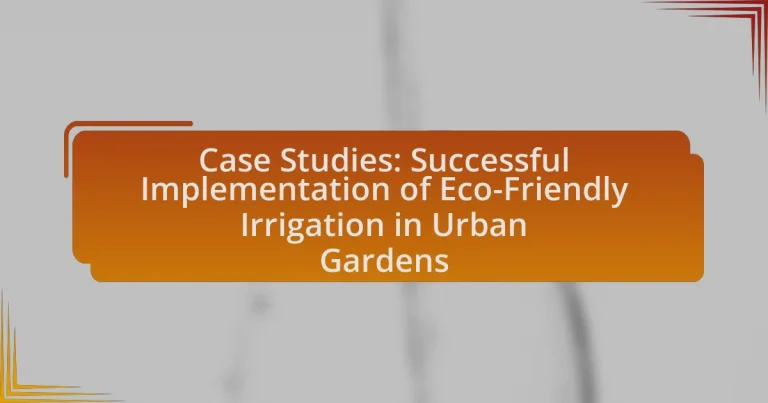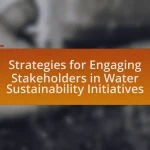Eco-friendly irrigation systems in urban gardens represent sustainable practices aimed at conserving water while effectively delivering it to plants. This article explores various eco-friendly irrigation methods, including drip irrigation, rainwater harvesting, and smart irrigation technologies, highlighting their advantages over traditional irrigation methods. It discusses successful case studies from cities like Melbourne and New York, detailing the environmental benefits, challenges faced during implementation, and strategies for overcoming these obstacles. Additionally, the article provides guidance for urban gardeners on designing and maintaining eco-friendly irrigation systems, along with resources for funding and support.
What are Eco-Friendly Irrigation Systems in Urban Gardens?
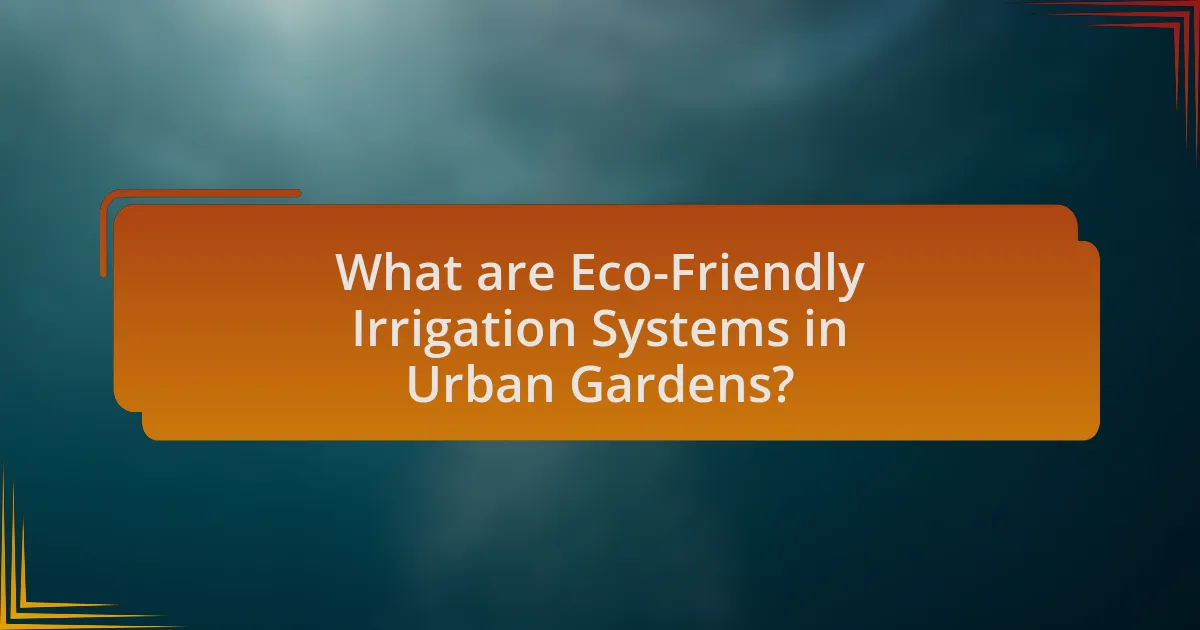
Eco-friendly irrigation systems in urban gardens are sustainable methods designed to conserve water while efficiently delivering it to plants. These systems often include techniques such as drip irrigation, which minimizes evaporation and runoff by delivering water directly to the plant roots, and rainwater harvesting, which collects and stores rainwater for irrigation use. Research indicates that drip irrigation can reduce water usage by up to 60% compared to traditional methods, making it a highly effective solution for urban environments where water scarcity is a concern. Additionally, the integration of smart irrigation technologies, such as soil moisture sensors, further enhances water efficiency by ensuring that irrigation occurs only when necessary.
How do eco-friendly irrigation systems differ from traditional methods?
Eco-friendly irrigation systems differ from traditional methods primarily in their water efficiency and sustainability practices. Traditional irrigation often relies on methods like flood or surface irrigation, which can lead to significant water wastage and soil erosion. In contrast, eco-friendly systems, such as drip or subsurface irrigation, deliver water directly to the plant roots, minimizing evaporation and runoff. Research indicates that drip irrigation can reduce water usage by up to 60% compared to traditional methods, making it a more sustainable choice for urban gardens. Additionally, eco-friendly systems often incorporate rainwater harvesting and smart technology for monitoring soil moisture, further enhancing their efficiency and reducing reliance on municipal water supplies.
What technologies are used in eco-friendly irrigation systems?
Eco-friendly irrigation systems utilize technologies such as drip irrigation, rainwater harvesting, and smart irrigation controllers. Drip irrigation delivers water directly to the plant roots, minimizing evaporation and runoff, which can reduce water usage by up to 50% compared to traditional methods. Rainwater harvesting systems collect and store rainwater for irrigation, promoting water conservation and reducing reliance on municipal water supplies. Smart irrigation controllers use weather data and soil moisture sensors to optimize watering schedules, ensuring that plants receive the right amount of water at the right time, further enhancing water efficiency. These technologies collectively contribute to sustainable water management in urban gardens.
How do these technologies contribute to sustainability?
Eco-friendly irrigation technologies contribute to sustainability by optimizing water usage and reducing waste. These systems, such as drip irrigation and smart controllers, deliver water directly to plant roots, minimizing evaporation and runoff. For instance, studies show that drip irrigation can reduce water consumption by up to 60% compared to traditional methods. Additionally, these technologies often incorporate rainwater harvesting and soil moisture sensors, further enhancing water efficiency and promoting the conservation of natural resources. By decreasing water usage and improving crop yields, eco-friendly irrigation supports sustainable urban gardening practices.
Why is eco-friendly irrigation important for urban gardens?
Eco-friendly irrigation is important for urban gardens because it conserves water, reduces pollution, and promotes sustainable practices. Urban areas often face water scarcity, and eco-friendly irrigation methods, such as drip irrigation and rainwater harvesting, can significantly decrease water usage by delivering water directly to the plant roots. Additionally, these methods minimize runoff, which can carry pollutants into local waterways, thereby protecting urban ecosystems. Studies indicate that implementing eco-friendly irrigation can reduce water consumption by up to 50%, making it a crucial strategy for enhancing urban garden sustainability and resilience.
What environmental benefits do these systems provide?
Eco-friendly irrigation systems provide significant environmental benefits, including water conservation, reduced runoff, and improved soil health. These systems utilize techniques such as drip irrigation and rainwater harvesting, which can reduce water usage by up to 50% compared to traditional methods, thereby conserving this vital resource. Additionally, by minimizing runoff, these systems help prevent soil erosion and reduce the transport of pollutants into local waterways. Improved soil health is achieved through better moisture retention and nutrient management, which supports plant growth and biodiversity. Studies have shown that implementing such systems in urban gardens can lead to a more sustainable urban ecosystem, enhancing both environmental quality and urban resilience.
How do they impact water conservation efforts?
Eco-friendly irrigation systems significantly enhance water conservation efforts by optimizing water usage and reducing waste. These systems, such as drip irrigation and rainwater harvesting, deliver water directly to plant roots, minimizing evaporation and runoff. Research indicates that drip irrigation can reduce water usage by up to 60% compared to traditional methods, thereby conserving substantial amounts of water in urban gardens. Additionally, rainwater harvesting systems can capture and utilize stormwater, further decreasing reliance on municipal water supplies. This efficient management of water resources directly contributes to sustainable urban gardening practices and promotes overall water conservation.
What are some successful case studies of eco-friendly irrigation in urban gardens?
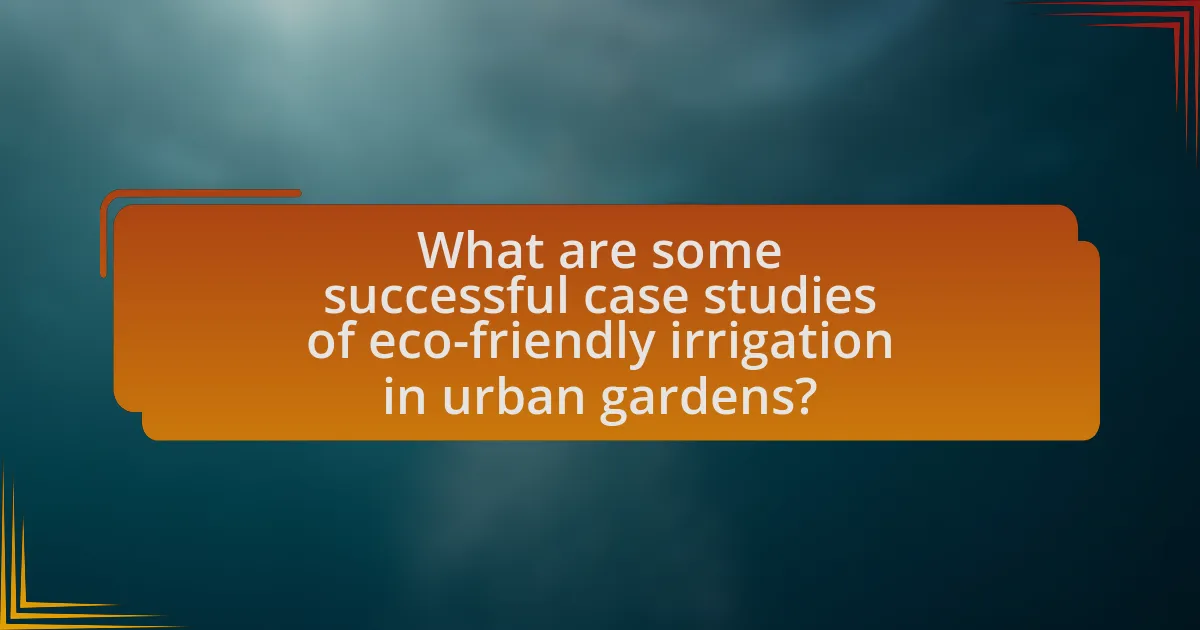
Successful case studies of eco-friendly irrigation in urban gardens include the use of rainwater harvesting systems in cities like Melbourne, Australia, and the implementation of drip irrigation in community gardens in New York City. In Melbourne, the city has integrated rainwater tanks into urban gardens, allowing residents to collect and utilize rainwater for irrigation, which has led to a significant reduction in potable water use. In New York City, community gardens have adopted drip irrigation systems that deliver water directly to the plant roots, minimizing waste and promoting efficient water use. These initiatives demonstrate effective strategies for sustainable water management in urban gardening contexts.
Which cities have implemented successful eco-friendly irrigation systems?
Cities that have implemented successful eco-friendly irrigation systems include Barcelona, Spain; Los Angeles, California; and Singapore. Barcelona utilizes a smart irrigation system that optimizes water usage based on weather forecasts and soil moisture levels, reducing water consumption by up to 30%. Los Angeles has adopted a rainwater harvesting program that captures stormwater for irrigation, significantly decreasing reliance on imported water. Singapore employs a comprehensive network of green roofs and vertical gardens that integrate efficient irrigation techniques, contributing to the city’s goal of becoming a “City in a Garden.”
What specific projects have shown significant results?
The specific projects that have shown significant results in eco-friendly irrigation for urban gardens include the “Green Roofs for Healthy Cities” initiative and the “Smart Irrigation Systems” project in various metropolitan areas. The “Green Roofs for Healthy Cities” initiative has demonstrated a reduction in stormwater runoff by up to 50%, improving urban biodiversity and air quality. The “Smart Irrigation Systems” project, implemented in cities like San Francisco, has achieved water savings of approximately 30% through the use of moisture sensors and automated scheduling, leading to healthier plants and reduced water waste. These projects provide concrete evidence of the effectiveness of eco-friendly irrigation methods in urban settings.
How were these projects funded and supported?
These projects were funded and supported through a combination of government grants, private donations, and community fundraising efforts. For instance, local municipalities often allocated budgetary resources specifically for sustainable urban development initiatives, while non-profit organizations provided financial backing through grants aimed at promoting eco-friendly practices. Additionally, community members contributed through fundraising events, which helped to raise awareness and gather necessary funds for the implementation of eco-friendly irrigation systems in urban gardens.
What challenges were faced during the implementation of these systems?
The challenges faced during the implementation of eco-friendly irrigation systems in urban gardens included high initial costs, technical complexity, and resistance from stakeholders. High initial costs often deterred adoption, as many urban gardeners lacked the financial resources to invest in advanced irrigation technologies. Technical complexity posed difficulties in installation and maintenance, requiring specialized knowledge that many users did not possess. Additionally, resistance from stakeholders, including local governments and community members, hindered progress due to concerns about changes in land use and water management practices. These factors collectively impacted the successful implementation of eco-friendly irrigation systems in urban settings.
How were these challenges overcome in successful case studies?
Successful case studies in eco-friendly irrigation for urban gardens overcame challenges through innovative technology, community engagement, and adaptive management strategies. For instance, the integration of smart irrigation systems allowed for precise water usage, significantly reducing waste and ensuring optimal plant health. Community workshops educated residents on sustainable practices, fostering a sense of ownership and responsibility towards the gardens. Additionally, adaptive management techniques enabled project leaders to respond to unforeseen issues, such as varying soil conditions or climate changes, ensuring the long-term viability of the irrigation systems. These approaches collectively demonstrate effective solutions to the challenges faced in implementing eco-friendly irrigation.
What lessons were learned from these implementations?
The lessons learned from the implementations of eco-friendly irrigation in urban gardens include the importance of water conservation, the effectiveness of drip irrigation systems, and the benefits of community engagement. Water conservation was highlighted as a critical factor, with studies showing that these systems can reduce water usage by up to 50% compared to traditional methods. The effectiveness of drip irrigation systems was proven through increased plant health and reduced water waste, as they deliver water directly to the roots. Additionally, community engagement fostered a sense of ownership and responsibility among residents, leading to sustained maintenance and support for the gardens.
How can urban gardeners implement eco-friendly irrigation systems?
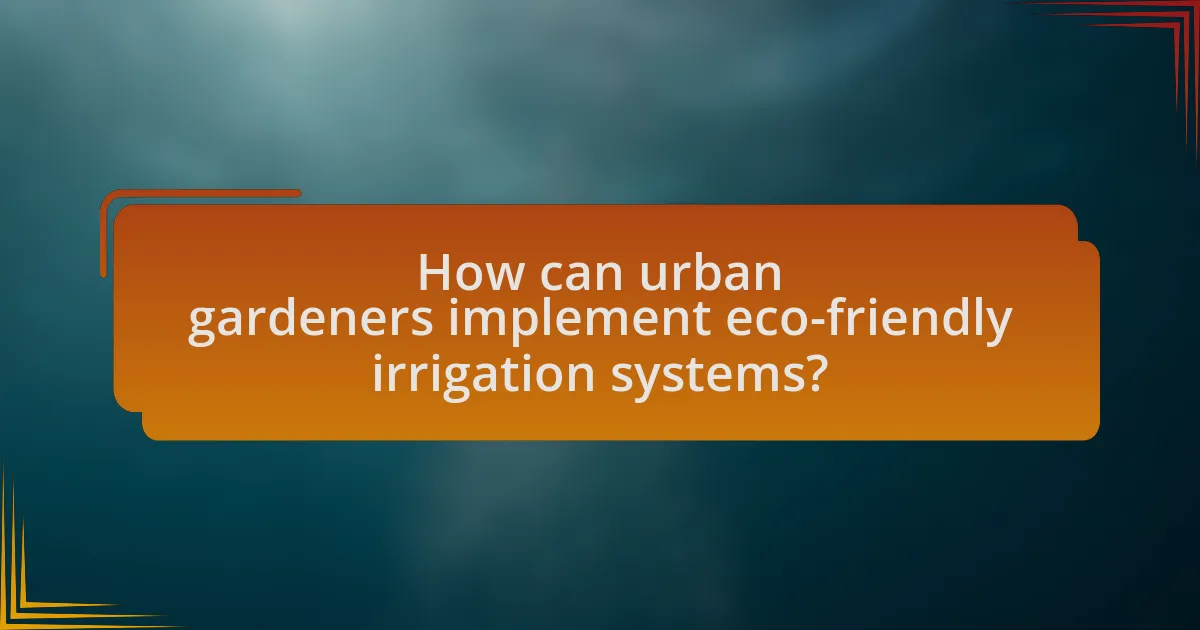
Urban gardeners can implement eco-friendly irrigation systems by utilizing rainwater harvesting, drip irrigation, and smart irrigation technologies. Rainwater harvesting involves collecting and storing rainwater from rooftops for irrigation, which reduces reliance on municipal water supplies and conserves water. Drip irrigation delivers water directly to the plant roots, minimizing evaporation and runoff, and is shown to use up to 60% less water than traditional methods. Smart irrigation technologies, such as soil moisture sensors and weather-based controllers, optimize water usage by adjusting irrigation schedules based on real-time data, leading to more efficient water management. These methods collectively contribute to sustainable gardening practices and promote water conservation in urban environments.
What steps should be taken to design an eco-friendly irrigation system?
To design an eco-friendly irrigation system, one should first assess the specific water needs of the plants and the local climate conditions. This assessment allows for the selection of appropriate irrigation methods, such as drip irrigation or rainwater harvesting, which minimize water waste. Next, incorporating soil moisture sensors can optimize water usage by ensuring irrigation occurs only when necessary. Additionally, using native plants that require less water can further enhance sustainability. Implementing a system that recycles greywater can also contribute to water conservation. Research indicates that drip irrigation can reduce water usage by up to 60% compared to traditional methods, demonstrating its effectiveness in eco-friendly practices.
What factors should be considered in the planning phase?
In the planning phase for eco-friendly irrigation in urban gardens, key factors include site assessment, water source availability, soil type, plant selection, and budget constraints. Site assessment involves evaluating the garden’s layout, sunlight exposure, and existing infrastructure, which directly influences irrigation design. Water source availability is crucial, as it determines the sustainability of the irrigation system; options may include rainwater harvesting or municipal water supply. Soil type affects water retention and drainage, impacting the choice of irrigation method. Plant selection should prioritize native and drought-resistant species to enhance water efficiency. Lastly, budget constraints dictate the feasibility of various irrigation technologies, such as drip systems or smart controllers, ensuring that the project remains economically viable.
How can gardeners assess their water needs effectively?
Gardeners can assess their water needs effectively by utilizing soil moisture sensors and monitoring local weather conditions. Soil moisture sensors provide real-time data on the moisture levels in the soil, allowing gardeners to determine when irrigation is necessary. Additionally, tracking rainfall and temperature patterns helps gardeners adjust their watering schedules accordingly, ensuring that plants receive adequate hydration without overwatering. Research indicates that using these methods can lead to a 30% reduction in water usage while maintaining healthy plant growth, demonstrating their effectiveness in eco-friendly irrigation practices.
What best practices should urban gardeners follow for successful implementation?
Urban gardeners should follow best practices such as selecting appropriate plant species, utilizing efficient irrigation systems, and implementing soil management techniques for successful implementation. Choosing native or drought-resistant plants reduces water usage and enhances resilience to local climate conditions. Efficient irrigation systems, like drip irrigation, minimize water waste and deliver moisture directly to plant roots, which is crucial in urban settings where water resources may be limited. Additionally, proper soil management, including composting and mulching, improves soil health and moisture retention, further supporting plant growth. These practices are supported by studies indicating that urban gardens employing efficient irrigation and soil management techniques yield higher productivity and sustainability.
How can gardeners maintain their eco-friendly irrigation systems?
Gardeners can maintain their eco-friendly irrigation systems by regularly checking for leaks, ensuring proper filtration, and adjusting watering schedules based on weather conditions. Regular inspections help identify leaks that can waste water, while maintaining filters prevents clogging and ensures efficient water delivery. Additionally, adjusting watering schedules according to rainfall and temperature can optimize water usage, reducing waste and promoting plant health. Studies show that efficient irrigation practices can reduce water consumption by up to 50%, demonstrating the effectiveness of these maintenance strategies.
What common mistakes should be avoided during implementation?
Common mistakes to avoid during the implementation of eco-friendly irrigation in urban gardens include inadequate planning, insufficient stakeholder engagement, and neglecting maintenance requirements. Inadequate planning often leads to misallocation of resources and ineffective system design, which can compromise the efficiency of the irrigation system. Insufficient stakeholder engagement can result in a lack of community support and understanding, ultimately hindering the project’s success. Neglecting maintenance requirements can cause systems to fail over time, as regular upkeep is essential for optimal performance. These mistakes have been documented in various case studies, highlighting the importance of thorough preparation and ongoing management for successful implementation.
What resources are available for urban gardeners interested in eco-friendly irrigation?
Urban gardeners interested in eco-friendly irrigation can access a variety of resources, including online platforms, community workshops, and local agricultural extension services. Websites such as the American Society of Landscape Architects provide guidelines on sustainable irrigation practices, while organizations like the National Gardening Association offer educational materials and resources tailored to urban gardening. Additionally, local universities often conduct workshops and provide research on eco-friendly irrigation techniques, such as rainwater harvesting and drip irrigation systems, which have been shown to conserve water effectively. These resources collectively support urban gardeners in implementing sustainable irrigation solutions.
Where can gardeners find funding or grants for their projects?
Gardeners can find funding or grants for their projects through various sources such as government programs, nonprofit organizations, and private foundations. For instance, the U.S. Department of Agriculture offers grants specifically for community gardening and sustainable agriculture initiatives. Additionally, organizations like the American Community Garden Association provide resources and funding opportunities for urban gardening projects. Local government initiatives often have grant programs aimed at enhancing green spaces, which can also support eco-friendly irrigation projects. These funding sources are designed to promote sustainable practices and community engagement in gardening efforts.
What organizations provide support and information on eco-friendly practices?
Organizations that provide support and information on eco-friendly practices include the Environmental Protection Agency (EPA), which offers resources on sustainable practices and environmental protection. Additionally, the World Wildlife Fund (WWF) promotes conservation and sustainable practices globally, providing educational materials and support for eco-friendly initiatives. The Sierra Club focuses on grassroots environmental advocacy and offers information on sustainable living practices. Lastly, local cooperative extension services often provide region-specific guidance on eco-friendly gardening and irrigation practices. These organizations are recognized for their contributions to promoting sustainability and eco-friendly practices through various resources and community engagement initiatives.
